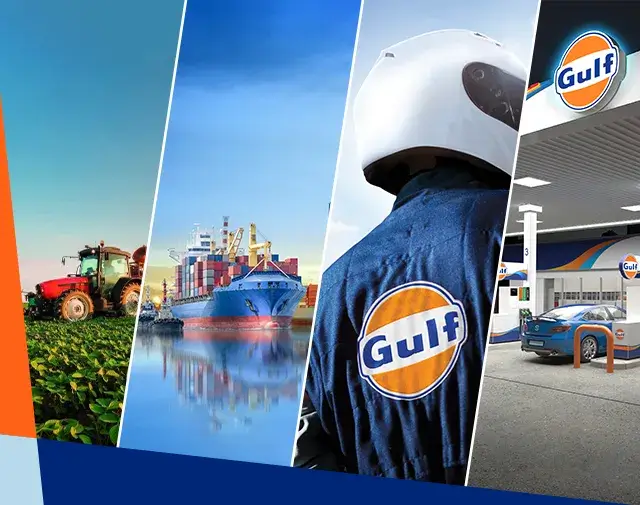Drive Success: How Fleet Managers Can Optimise Their Car Operations
01 Oct 2025

If you’re managing taxis, hire cars, delivery vehicles, or company cars, you already know one thing: every minute counts. From rising fuel costs to compliance pressures, car fleet managers are under more strain than ever, with 87% of fleet managers overseeing maintenance compliance. So how do you keep your fleet efficient, compliant, and cost-effective?
In this blog, we’ll cover everything you need to know about fleet management for fleets of cars and how expert partners like Gulf Oil can help you reduce downtime and operating costs. Let’s get started.

Common challenges for fleet managers
Car fleet managers are responsible for the administration of a business's vehicle fleet to ensure it operates safely and efficiently. They face many challenges within their fleet that are often unexpected or unavoidable. From compliance, vehicle maintenance and driver reports to fuel usage, optimisation, environmental standards and managing the shift to electric vehicles, there is a lot to consider.
Here are some of the key challenges facing car fleet managers:
- Rising fuel costs are beyond the control of fleet managers, and their unpredictable nature can make operational costs difficult to predict and manage. This can impact profitability and create uncertainty around budgets.
- Unexpected breakdowns & downtime can lead to lost revenue, disrupt operations, decrease driver productivity and damage reputations. If some or all cars within the fleet are experiencing downtime, work isn’t completed on time, which can cause delays in service and unhappy customers.
- Record-keeping & compliance headaches are common complaints for car fleet managers because they are time-consuming and require robust systems. Fleet managers often deal with a high volume of manual data, complex regulations that change frequently, and face the risk of costly fines due to non-compliance.
- Managing large volumes of vehicles and drivers makes data management challenging, especially if old paper systems are involved. Additionally, operational costs are higher with more drivers and driver safety and compliance become more difficult to manage.

Best practices for effective fleet management
While managing a car fleet can be a difficult and intricate task, modern solutions make it easier to automate tasks and track progress. By leveraging the appropriate software, tracking real-time driver behaviour, optimising routes and reducing downtime, your car fleet can operate efficiently and profitably. Here are some best practices for overcoming common challenges with managing your car fleet.
Use fleet management software
Telematics software allows you to track drivers, optimise their routes and monitor driver behaviour which can cut fuel costs by 24%. Meanwhile, using fleet management software can help you to schedule fleet maintenance and stay on top of compliance with automated reminders for things like services. By integrating both platforms, you can analyse the data and use it to improve performance.
Create a preventive maintenance schedule
Preventive maintenance allows you to regularly inspect and service the cars in your fleet to prevent unexpected breakdowns and repairs. Regular servicing can also help to identify small problems before they become larger and more expensive repairs. It often includes checking tyres, fluid levels and condition, brakes and inspecting the engine.
Monitor KPIs
Monitoring KPIs allows fleet managers to maintain efficiency and manage expenses. By keeping a close eye on fuel costs, you can determine the cost per mile and make optimisations to improve fuel efficiency. When you closely monitor KPIs, you can begin to see where your fleet is excelling and where there are shortfalls so you can make improvements and minimise downtime.
Adopt green initiatives
As environmental standards change, our driving choices need to adapt to comply with the latest requirements. 70% of fleet managers plan to adopt alternative fuels over the coming years, including hybrid or electric cars to adhere to environmental standards or enhance your company's commitment to sustainability.
Standardise fuel and lubricant choices
When procuring your fleet, it might be beneficial to choose multiple cars of the same model. That way, you can streamline your fleet’s lubricant and fluid choices for consistency and reliability. Mixed fleets bring a variety of challenges, as older vehicles require regular maintenance due to high mileage, while new-generation cars are equipped with aftertreatment devices to reduce emissions, requiring specific lubrication chemistry — typically lower SAPS lubricants, which help improve fuel efficiency and decrease downtime.

How Gulf Oil supports fleet managers
Finding solutions that improve the performance and efficiency of your fleet is essential, and that’s where Gulf Oil can help by working alongside your fleet manager. We can advise on high-performance lubricants and oils to extend vehicle life, while our fuel-efficient product range can contribute towards lower running costs.
We have specific products for Hybrid, electric, older generation/ high mileage and new generation cars to help with compliance - emission control etc.
With expert maintenance support, we can help you form a lubrication strategy that minimises unplanned downtime and extends the lifespan of your fleet.
The future of fleet management
Fleet management is ever-evolving, so there are practices you may need to adopt to improve your way of working or adhere to new standards. With climate change at the forefront of many business decisions, prioritising sustainability will be key to meeting your company’s sustainability goals and ensuring your fleet is compliant. So, you may decide to join the shift towards electric and hybrid fleets.
In addition, digital tools like telematics and AI-based maintenance predictions can help you to analyse and optimise your fleet. By streamlining your day-to-day admin tasks and using sophisticated software to predict service intervals, you can improve fleet performance and efficiency with less admin.
Improve efficiency and reduce downtime
Proactive car fleet management helps you to stay on top of compliance, services and maintenance and allows you to focus on optimising your fleet’s performance and improving efficiency. With regular servicing, oil changes and vehicle maintenance, you can avoid costly repairs. Meanwhile, working with a trusted lubrication partner, like Gulf, ensures your fleet is using the right combination of lubricants to deliver the best performance.
Discover more about our car lubricants to help you reduce maintenance costs and maximise uptime.

